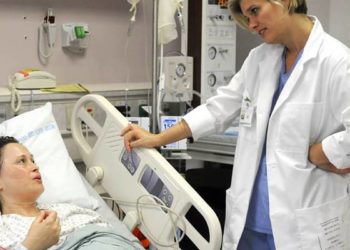2 Minute Medicine Rewind February 23 – March 1, 2015
In this section, we highlight the key high-impact studies, updates, and analyses published in medicine during the past week.
Current national society guidelines recommend 12 months of dual antiplatelet therapy (DAPT) for patients who underwent percutaneous coronary intervention with drug eluting stent deployment. Dual antiplatelet therapy is thought to decrease the risk of late in-stent thrombosis. In this multicenter, randomized control trial, 2031 patients who underwent implantation of a everolimus-eluting stent and confirmed good aspirin response were randomized to either 6 or 24 months of dual antiplatelet therapy. At 12 month follow-up, there was no statistically significant difference in a composite outcome of death, repeat myocardial infarction, stroke, or major bleeding (1.5% in 24-month DAPT arm vs. 1.6% in 6-month DAPT arm, p = 0.85). There is thought that second generation drug eluting stents have a decreased risk of stent thrombosis compared to first generation drug eluting stents and that a shorter duration of DAPT could have similar outcomes.
Outcomes of pregnancy after bariatric surgery
Maternal characteristics such metabolic syndrome and associated obesity, diabetes, and hyperlipidemia are known risk factors for fetal complications including congenital abnormalities, stillbirth, and macrosomia. In this retrospective registry study, investigators identified 670 Swedish women who underwent bariatric surgery and subsequently had singleton pregnancies and compared outcomes to similar women with elevated BMI who had not undergone bariatric surgery. Women who had underwent bariatric surgery were less likely to develop gestational diabetes (1.9% vs. 6.8%, p < 0.001) or macrosomia (8.6% vs. 22.4%, p < 0.001), however were at higher risk for microsomia (15.6% vs. 7.6% p< 0.001) and had shorter gestational times (273 days vs. 277.5 days, p < 0.001). There was a trend towards increase in the proportion of stillbirths or neonatal death (1.7% vs. 0.7%, p = 0.06). Bariatric surgery has known complications of malnutrition and vitamin deficiency, which are consistent with this articles findings of increased microsomia, shorter gestational times, and trend towards greater mortality.
During acute life-threatening bleeds, rapid reversal of the anticoagulation by vitamin K antagonists is an emergent priority. There are many options including four-factor prothrombin complex concentrate and fresh frozen plasma for the emergent reversal of Coumadin. In this nonblinded, multicenter randomized trial, 181 patients requiring rapid vitamin K antagonist reversal were randomized to either four-factor prothrombin complex concentrate (4F-PCC) or fresh frozen plasma (FFP) in addition to vitamin K and were assessed for INR correction and adequate hemostasis. Rapid INR correction to less than 1.3 within half an hour was achieved in 56% of patients receiving 4F-PCC vs. 10% of patients receiving FFP (difference 45.3%, 95%CI 31.9-56.4%). Effective hemostasis was achieved in 90% of patients who recieved 4F-PCC vs. 75% of patients who received FFP (difference 14.3%, 95%CI 2.8 – 25.8%). The investigators felt that this study showed the superiority of 4F-PCC over FFP for rapid INR correction and hemostasis in emergent situations.
Chronic nonsteriodial anti-inflammatory drugs (NSAIDs) are common, frequently used class of analgesic, however it’s use is associated with gastritis as well as thrombotic cardiovascular events in patients with cardiovascular risk. In this retrospective registry study of Danish patients greater than 30 years of age who were admitted for the first time for myocardial infarction, investigators reviewed the proportion of patients who were prescribed at least 1 NSAID medication and long term outcomes. This study identified 61,971 patients who were alive 30 days after discharge for first myocardial infarction and had registry follow-up for a median of 3.5 years. 34% of patients filled a prescription for at least 1 NSAID, and patients who had NSAID treatment were more likely to have bleeding events (4.2 events per 100 person-years vs. 2.2 events per 100 person-years, adjusted HR 2.02, 95% CI 1.81-2.26) as well as cardiovascular events (11.2 events vs. 8.3 events, adjusted HR 1.40, 95% CI 1.30-1.49). This effect was sustained in subgroup analysis regardless of type of NSAID or type of concomitant antithrombotic treatment. The American Heart Association discourages NSAID use in patients with heart disease, and this study suggests that there is no safe post-procedural time period and such an effect is still appreciable after many years.
Randomized trial of peanut consumption in infants at risk for peanut allergy
Peanut allergy is a common allergy among children and its prevalence has been increasing over the last ten years in many disparate parts of the world. In this single center open label trial in the United Kingdom, 640 infants less than 11 months of age with severe eczema and/or egg allergy were randomized to either consume or avoid peanuts until 5 years of age. Allergen skin testing with peanut extract was performed at follow-up to determine the frequency of developing peanut allergy. At five years of age, 13.7% of children in the avoidance group who initially had a negative skin reaction developed a skin reaction to peanut allergen compared to ony 1.9% of the consumption group (p < 0.001). Of the 98 participants who initially had a positive skin test, 35.3% of child in the avoidance group continued to have a peanut allergy compared to 10.6% of the consumption group (p = 0.004). Children who consumed peanuts had decreased titers of peanut-specific IgE compared to children in the avoidance group. This study suggests that early exposure to peanuts reduced the development of peanut allergy in children at high risk for this allergy.
Image: CC/H. Zell/Wiki
©2015 2 Minute Medicine, Inc. All rights reserved. No works may be reproduced without expressed written consent from 2 Minute Medicine, Inc. Inquire about licensing here. No article should be construed as medical advice and is not intended as such by the authors or by 2 Minute Medicine, Inc.







